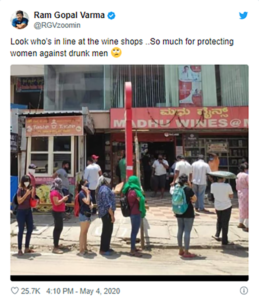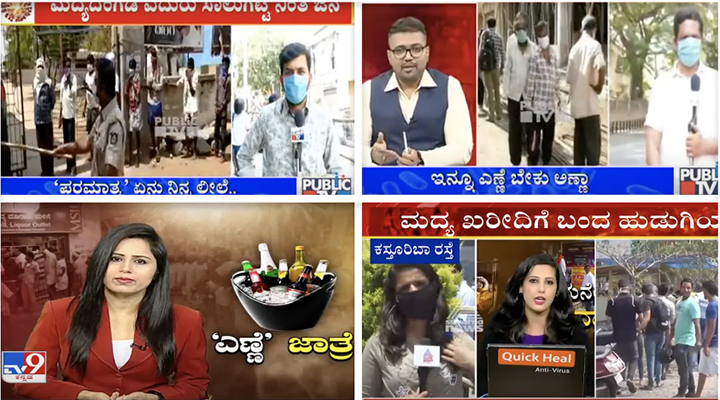Activists slam Kannada media’s coverage of women buying liquor
On May 4, when the nationwide lockdown to contain the spread of coronavirus was eased after over a month, liquor shops were among the business establishments that reopened. As pictures and videos appeared of people queuing up to buy alcohol in several parts of the country, the Twitterati, as is there won’t, promptly sat on the judgement.
Soon, the mainstream media joined in the shaming. In Karnataka, TV news channels seemed especially aggrieved that women were among those buying liquor.
On TV9 Kannada, anchor Sukanya Sampath launched into a rant, complaining that women were buying alcohol “openly” unlike in the past when they drank in secret. “It feels like their main aim now is to buy alcohol,” she declared. “It would be really wrong if we say only men are waiting to buy alcohol. As we can see from the visuals, women and young girls are also standing in the line.”
In another bulletin, the same anchor talked at length about how women had waited since 6 am to purchase liquor from a shop in Rajajinagar, Bengaluru. Commenting on a visual of a woman holding a bottle of liquor and flashing a victory sign, she said, “Alcohol consumption is injurious to health. If you have bought that bottle, there’s no need to show it on camera.”
Asked about this, TV9 Kannada editor Kabeer, who uses only his first name, told Newslaundry that they had only aired what they saw on the ground. “We didn’t show it deliberately, we telecast what we saw in the city. We are not objectifying women and we have no problem with any woman purchasing alcohol and all. It’s common,” he said.
But women’s rights groups and activists aren’t convinced. Rekha Sharma, chief of the National Commission for Women, said much of the media’s coverage of this issue was not sensitive. “India’s constitution has given equal rights to everyone and there is no such thing as women cannot enjoy,” she added.
She further said the NCW would “look into this issue” and take action against media organisations found to have violated the norms.
The Cable Television Network Regulation Act, 1995 lays down that the women must not be portrayed in a way that “emphasises passive, submissive qualities and encourages them to play a subordinate, secondary role in the family and society”. The News Broadcasting Standards Regulations state that TV channels can’t reveal the identity, images or videos of a woman without taking proper permission from them and the privacy of women must be respected.
Widespread problem
TV9 Kannada was not the only Kannada TV channel to air what women’s activists have denounced as sexist coverage. On TV5 Kannada, anchor Nikita Girish claimed a woman had fallen unconscious while standing in a queue to buy alcohol because she had come out to the shop before even having breakfast. The anchor didn’t bother substantiating these claims.
A young woman had come out without wearing a mask and she was repeatedly trying to cover her face with her hands to avoid being recorded. But the TV5 Kannada cameraperson followed her relentlessly until her face was clearly visible. This footage was played at least 10 times in a six-minute bulletin.
On Suvarna TV, owned by BJP leader Rajeev Chandrasekhar, anchor Pratima Bhat spoke disparagingly about “women and girls who have been standing in queues since morning in Manipal and Bengaluru city”. As she spoke, a video of two young women carrying cold drinks and liquor bottles played 13 times on a loop.
A cameraperson with Public TV made a woman, whose face was masked, so uncomfortable that she had to seek help from a man in the queue. The man gestured to the cameraperson to turn away with an obscene sign.
Such coverage by the Kannada media caused outrage online and offline.
“We women can drink and smoke based on our interests. It doesn’t have anything to do with gender,” said Gayatri Sa, a freelance writer in Bengaluru. “We should not be catcalled, teased or stared at. Just accept us. Just as it is normal for a man to come and buy alcohol, it’s for a woman. I’m not talking about our privileges or the patriarchy, it’s just very humanly to accept that we can do whatever men can.”
Maitreyi Krishnan, a lawyer at the Karnataka High Court, said the media’s coverage was “a complete violation of the privacy of all individuals standing there, and specifically pointing out women standing in a queue was absolutely retrograde”.

“Saying such things to women is absolutely unethical and it can not even be called journalism at a time when migrant labourers are facing extreme difficulties like not having food and being unable to go home,” she added. “Instead of showing relevant issues, the media are showing this patriarchal mindset which is extremely disturbing. Singling out people on the basis of gender is extremely problematic and action needs to be taken against such organisations. We need to think where we are going as a society as this stereotyping will make women more vulnerable.”
Kannada news stories translated by Tejas Dayanand Sagar.
Kapil Kajal is a freelance writer based in Bengaluru and a member of 101Reporters.com, a pan-India network of grassroots reporters.
www.newslaundry.com





